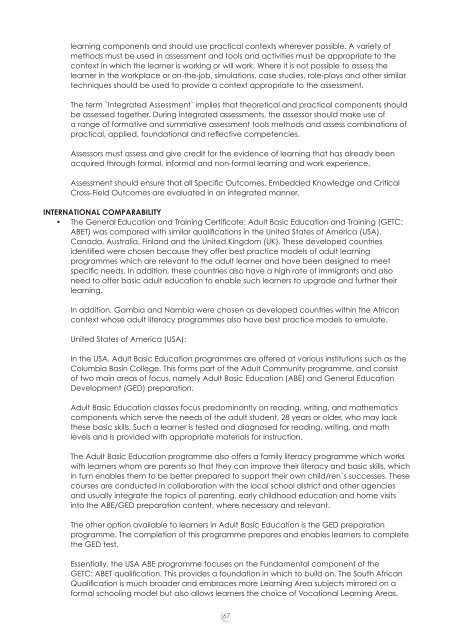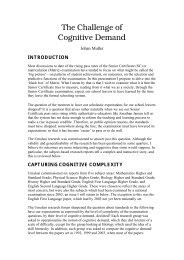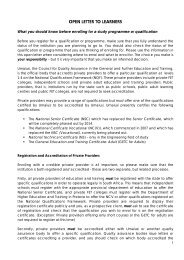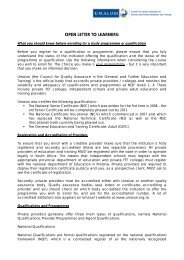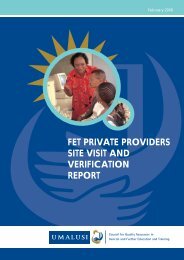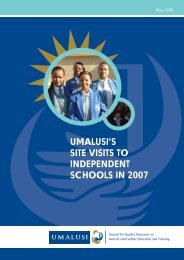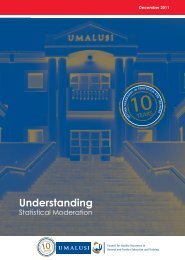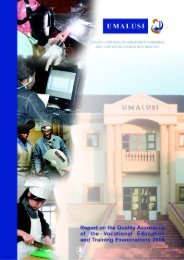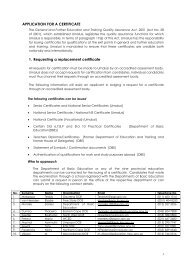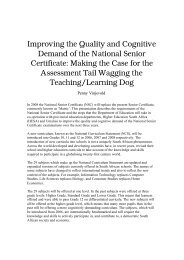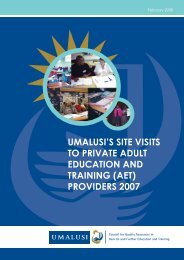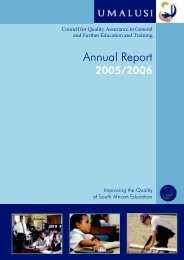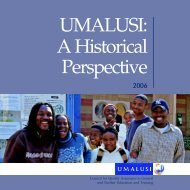Inspecting the Foundations - Umalusi
Inspecting the Foundations - Umalusi
Inspecting the Foundations - Umalusi
You also want an ePaper? Increase the reach of your titles
YUMPU automatically turns print PDFs into web optimized ePapers that Google loves.
learning components and should use practical contexts wherever possible. A variety ofmethods must be used in assessment and tools and activities must be appropriate to <strong>the</strong>context in which <strong>the</strong> learner is working or will work. Where it is not possible to assess <strong>the</strong>learner in <strong>the</strong> workplace or on-<strong>the</strong>-job, simulations, case studies, role-plays and o<strong>the</strong>r similartechniques should be used to provide a context appropriate to <strong>the</strong> assessment.The term `Integrated Assessment` implies that <strong>the</strong>oretical and practical components shouldbe assessed toge<strong>the</strong>r. During integrated assessments, <strong>the</strong> assessor should make use ofa range of formative and summative assessment tools methods and assess combinations ofpractical, applied, foundational and refl ective competencies.Assessors must assess and give credit for <strong>the</strong> evidence of learning that has already beenacquired through formal, informal and non-formal learning and work experience.Assessment should ensure that all Specifi c Outcomes, Embedded Knowledge and CriticalCross-Field Outcomes are evaluated in an integrated manner.INTERNATIONAL COMPARABILITY• The General Education and Training Certifi cate: Adult Basic Education and Training (GETC:ABET) was compared with similar qualifi cations in <strong>the</strong> United States of America (USA),Canada, Australia, Finland and <strong>the</strong> United Kingdom (UK). These developed countriesidentifi ed were chosen because <strong>the</strong>y offer best practice models of adult learningprogrammes which are relevant to <strong>the</strong> adult learner and have been designed to meetspecifi c needs. In addition, <strong>the</strong>se countries also have a high rate of immigrants and alsoneed to offer basic adult education to enable such learners to upgrade and fur<strong>the</strong>r <strong>the</strong>irlearning.In addition, Gambia and Nambia were chosen as developed countries within <strong>the</strong> Africancontext whose adult literacy programmes also have best practice models to emulate.United States of America (USA):In <strong>the</strong> USA, Adult Basic Education programmes are offered at various institutions such as <strong>the</strong>Columbia Basin College. This forms part of <strong>the</strong> Adult Community programme, and consistof two main areas of focus, namely Adult Basic Education (ABE) and General EducationDevelopment (GED) preparation.Adult Basic Education classes focus predominantly on reading, writing, and ma<strong>the</strong>maticscomponents which serve <strong>the</strong> needs of <strong>the</strong> adult student, 28 years or older, who may lack<strong>the</strong>se basic skills. Such a learner is tested and diagnosed for reading, writing, and mathlevels and is provided with appropriate materials for instruction.The Adult Basic Education programme also offers a family literacy programme which workswith learners whom are parents so that <strong>the</strong>y can improve <strong>the</strong>ir literacy and basic skills, whichin turn enables <strong>the</strong>m to be better prepared to support <strong>the</strong>ir own child/ren`s successes. Thesecourses are conducted in collaboration with <strong>the</strong> local school district and o<strong>the</strong>r agenciesand usually integrate <strong>the</strong> topics of parenting, early childhood education and home visitsinto <strong>the</strong> ABE/GED preparation content, where necessary and relevant.The o<strong>the</strong>r option available to learners in Adult Basic Education is <strong>the</strong> GED preparationprogramme. The completion of this programme prepares and enables learners to complete<strong>the</strong> GED test.Essentially, <strong>the</strong> USA ABE programme focuses on <strong>the</strong> Fundamental component of <strong>the</strong>GETC: ABET qualifi cation. This provides a foundation in which to build on. The South AfricanQualifi cation is much broader and embraces more Learning Area subjects mirrored on aformal schooling model but also allows learners <strong>the</strong> choice of Vocational Learning Areas.67


